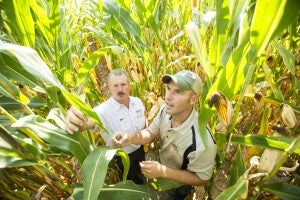Why ag advisers should increase conservation offerings to farmers
 Farmers have a host of competing priorities clamoring for their time, energy and money. Fortunately, they often have trusted advisers to help them make good decisions for their operations – including about conservation practices on the farm.
Farmers have a host of competing priorities clamoring for their time, energy and money. Fortunately, they often have trusted advisers to help them make good decisions for their operations – including about conservation practices on the farm.
These practices, such as improving fertilizer efficiency and planting cover crops, can provide significant benefits for farmers: increasing or stabilizing yields, reducing erosion, and ensuring more of the fertilizer applied delivers yield instead of being lost to water or air. They can also increase profitability.
But in order to get the best bang for every conservation buck, many of these practices require technical and agronomic expertise. As PrecisionAg suggested, who better to help integrate these practices into farm operations than the ag retailers and consultants who know their clients’ farms so well?
By expanding their conservation service offerings, ag retailers and crop advisers can meet growing demand from farmers – while also keeping their businesses, and that of their farmer clients, competitive.
[Tweet “Why ag advisers should increase conservation offerings to farmers, via @jamesbpowers.https://edf.org/7KF”]
Room for improvement
According to a 2015 paper [PDF] published by Iowa State University Extension and Outreach, 60 percent of Iowa farmers felt that their “fertilizer and ag chemical dealers should do more to help farmers address nutrient losses into waterways.” Not only are farmers demanding increased conservation services, they look to their ag retailer advisers to provide them.
This same paper noted that less than 14 percent of farmers learned about the state’s nutrient loss reduction strategy from their ag retailers, seed salespeople, or independent crop advisers and agronomists. Contrast that with the 63 percent that learned of the strategy from the farm press, or the more than 40 percent who heard about it through extension, NRCS or their Conservation District.
This suggests a bigger need for retailers to communicate with farmers on conservation topics, including how it can benefit their bottom line and make them more resilient to extreme weather.
Opportunity abounds
 Farmers are under pressure from many fronts – their communities, state and federal government, and customers – to help address water quality issues. Government conservation services cannot keep up with demand from farmers for conservation practices. Yet that demand will continue to grow while funding for government programs is likely to decline – creating the space for retailers and consultants to play an even larger role.
Farmers are under pressure from many fronts – their communities, state and federal government, and customers – to help address water quality issues. Government conservation services cannot keep up with demand from farmers for conservation practices. Yet that demand will continue to grow while funding for government programs is likely to decline – creating the space for retailers and consultants to play an even larger role.
Crop consultants and ag retailers should also recognize the growing demand for services that address concerns about more frequent dry periods and drought, increased heat stress on crops, higher incidence of crop disease, increased weed and insect pressures, more frequent extreme rains and increases in saturated soils. For example, service providers can help farmers be more resilient in the face of drought by planting cover crops, exploring crop rotations that reduce the risk and impact of pests and disease, or reducing erosion during extreme storms through conservation tillage.
Staying competitive
Ag retailers and crop consultants can absolutely lead the way in helping farmers to improve, increase and develop conservation practices. This will not just improve growers’ bottom lines, but also help ag retailers maintain customer loyalty.
Retailers can also take the lead in collecting, measuring and tracking appropriate ag data to help farmers show their customers, consumers and communities that farmers are champions of stewardship.
Related:
If you’re marketing a product to a farmer, show them where and how it will work >>
This Iowa farmer proves that profit and sustainability go hand in hand >>













3 Comments
The tools are available presently to help 60% of the farming areas in the USA to reduce their fertilizer and herbicide usage by 25-30% immediately. New varieties and species of cover crops are being introduced annually. As a plant breeder, I have developed clover varieties that can deliver 150-300 lbs. Of N/acre. The next step is for ag retailers to show the best management practices necessary to implement these new cover crops as they have the most contact with farmers. Corn breeders need to put more emphasis on improving yields on shorter season corn varieties instead of focusing on long season varieties that utilize the majority of the growing season leaving little time for cover crops. For most of America the tools are there, it all comes down to implementing them.
I’ve been hearing this suggestion quite a bit lately and agree that it would be great to have ag retailers offer more conservation services. They have the boots on the ground to make it happen. How do you see this actually playing out? After all, ag retailers stay in business in large part by selling fertilizers and pesticides. Would they really tell a farmer to buy less from them? Granted, there are conservation practices that don’t involve in-field nutrient and pest management, but many of those services are offered for “free” from NRCS. Would farmers pay out of pocket for services from a private firm that they have traditionally gotten from a government entity? Or would it be more of a quid pro quo, as in you buy fertilizer and chemicals from me and I’ll design your grassed waterways and terraces? I appreciate your thoughts.
Brian – thank you so much for reading the blog and for your thoughtful questions. As you suggest, NRCS does offer really important services, but unfortunately the utility of these services is limited given an inadequate number of staff on the ground, and because only a small percentage of farmers participate in NRCS programs. We would love to see and are advocating for increased funding for NRCS to expand service offerings and improve efficiencies (reduce the paperwork burden for farmers to take advantage of government programs, etc.), but for the foreseeable future we will absolutely need ag retailers to keep playing an essential role of farmer advisor. That’s because there’s still a widespread and unmet need for expertise on implementing conservation practices and precision ag technologies. That said, I think longer-term we are likely to see the ag retail sector shift towards a more service-based model. Farmers are increasingly being offered web-based tools and competitive prices from vendors (maybe we’ll see Amazon selling fertilizer at some point?) which may diminish the sales role of ag retailers. There will still always be a need for in-person counseling and geographically-specific knowledge, though – and my suggestion is that conservation services can be the “next big thing” for ag retailers to adopt and offer. I also see this as a potentially profitable solution to address the challenge of competitive prices from online dealers.